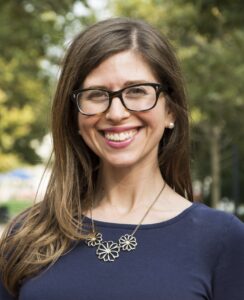 Dr. Meryl Alper is Associate Professor of Communication Studies at Northeastern University, where she is a Faculty Scholar with the Northeastern University Institute for Health Equity and Social Justice Research. Her lecture at the conference will be “Supporting Mental Health among Autistic Youth in the Digital Age.”
Dr. Meryl Alper is Associate Professor of Communication Studies at Northeastern University, where she is a Faculty Scholar with the Northeastern University Institute for Health Equity and Social Justice Research. Her lecture at the conference will be “Supporting Mental Health among Autistic Youth in the Digital Age.”
The impact of technology on young people’s mental health is complex. While devices, apps, and tools facilitate connection and identity experimentation, they can also exacerbate psychological, social, biological, and behavioral issues. The World Health Organization identifies media influence as a factor for the one in seven 10-to-19-year-olds with mental health conditions. Additionally, grouping all “young people” together as being equally adept with technology obscures the reality that social conditions, shaped by systems of discrimination and oppression, determine much of our ability to interact with media and technology.
Analyses of technology’s effects on children’s mental health often fail to take an intersectional perspective that addresses the ways in which aspects of identity like gender, ability, race, ethnicity, and socioeconomic class work together to uphold these systems. Meryl Alper’s work focuses explicitly on intersectionality as it affects technology use among young people with disabilities. In a forthcoming book, Alper explores how youth on the autism spectrum interact with technology in their daily lives. She draws on interviews with kids and their families to argue that experiences are less defined by their diagnosis and more affected by ways their disability intersects with these other aspects of identity.
Alper has quickly established herself as a preeminent scholar in fields of communication studies, sociology, and disability studies, publishing three books since earning her doctorate in 2015:bvg Digital youth with disabilities, Giving Voice: Mobile communication, disability, and inequality, and Kids across the spectrums: Growing up autistic in the digital age. She translates her work as a public intellectual through public commentary on technology and disability in news outlets like The New York Times and EdTech Magazine and has served as a consultant with Sesame Workshop, PBS KIDS, Nickelodeon, Disney, and Microsoft Research.
Alper is Associate Professor of Communication Studies at Northeastern University, where she is a Faculty Scholar with the Northeastern University Institute for Health Equity and Social Justice Research. She holds a doctorate in communication from the University of Southern California.
Learn More – How does technology affect the lives of disabled youth?
- The COVID-19 pandemic has affected everyone; however, it has opened up opportunities for some youth who have been diagnosed with ADHD or are on the autism spectrum, for example. This article addresses the social silver linings for these students.
- Season 2 Episode 1: Kids Across the Spectrums of the Critical Technology Podcast features Dr. Alper who discusses her ongoing research on the role of media and digital technologies in the lives of disabled children and their families.
- This journal article focuses on answering the overarching question of how technology helps people with disabilities by using a multiple case study methodology.